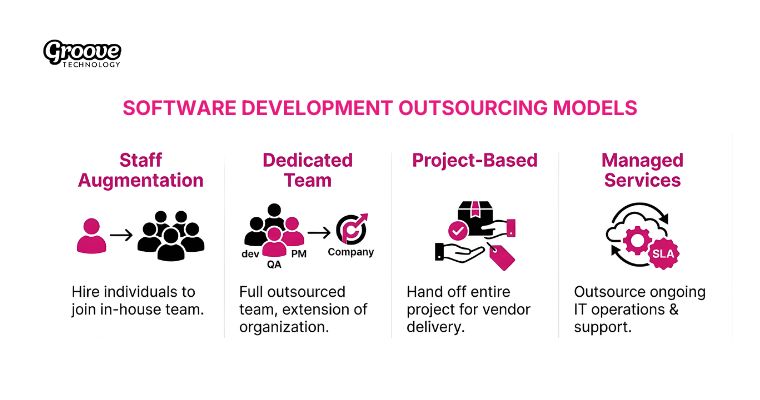What Is Software Development Outsourcing? A Complete Guide
Software development outsourcing is a model in which businesses engage an external technology partner to handle all or part of their software development activities instead of relying solely on in-house teams. By leveraging flexible geographic models such as onshore, nearshore, and offshore, alongside engagement approaches like staff augmentation or managed services, businesses can accelerate product delivery while optimizing internal resources more effectively.
That said, outsourcing is not a one-dimensional solution. Expanding development efforts beyond internal teams can introduce challenges related to communication, quality control, and the protection of core intellectual property. To address these risks, many organizations adopt a “Core vs. Context” model, keeping mission-critical capabilities and proprietary knowledge in-house, while delegating scalable execution work to specialized partners. This balanced approach allows companies to maintain control while remaining agile and responsive to growth demands.
When implemented thoughtfully, outsourcing consistently delivers measurable business value. A significant majority of organizations report positive outcomes, including strong returns on investment within the first 12 to 18 months. According to DesignRush, outsourcing reduces development costs by 15-70%, while Kinetic Staff notes that labor savings can reach 72% compared to in-house teams.
In this article, Groove Technology offers a comprehensive exploration of software development outsourcing, from key definitions and delivery models to benefits, challenges, and a step-by-step implementation guide. Together, these insights are designed to help you make informed, strategic decisions that align your technical requirements with long-term business objectives.

What Is Software Development Outsourcing?
Software development outsourcing refers to the practice of partnering with a software outsourcing company — a firm that specializes in providing outsourced software development services — to handle engineering tasks instead of relying solely on in-house teams. These companies typically offer experienced developers, software architects, and QA specialists who manage everything from application development and system maintenance to performance optimization and quality assurance.
In simple terms, a software outsourcing company acts as an extended technology partner rather than just a coding vendor. Beyond writing code, it helps businesses design suitable technical solutions, select the right technologies, and ensure long-term system stability throughout the product lifecycle. As a result, organizations can stay focused on their core business strategy while maintaining a high standard of technical execution.
Today, outsourcing goes far beyond traditional cost-saving objectives. Instead, companies increasingly view it as a long-term strategic approach to accessing world-class engineering talent, adopting emerging technologies, and filling skill gaps that may be difficult to address in local labor markets. At the same time, working with a software outsourcing company significantly reduces the complexity and cost of long-term hiring, onboarding, and operational management.
This shift is clearly reflected in global market growth. According to Statista, the software outsourcing market is projected to expand from $430 billion in 2023 to nearly $898 billion by 2031, achieving a compound annual growth rate (CAGR) of approximately 5–7.5%. This strong growth highlights how organizations are prioritizing flexible, scalable, and expertise-driven development models—exactly what software development outsourcing is designed to deliver.
Types Of Software Development Outsourcing
To select the most effective partnership model, businesses typically evaluate their geographic requirements based on these 4 primary categories of software development outsourcing:
- Onshore outsourcing refers to hiring development resources within the same country. Although it generally comes with higher costs, this model ensures seamless communication, cultural alignment, and compliance with domestic regulations. Onshore solutions are often preferred by organizations in highly regulated sectors such as finance, healthcare, or government, where data security, legal compliance, and real-time collaboration are top priorities.
- Nearshore outsourcing connects businesses with development teams in neighboring or nearby countries, usually within 1 – 4 time zones. This approach offers a practical balance between cost-efficiency and communication convenience. It allows for easier real-time collaboration and faster response times, making it ideal for mid-to-large companies that want to remain agile and responsive during development without disrupting internal workflows.
- Offshore outsourcing involves working with developers located in distant countries, often with significant time zone differences. This model is typically chosen to cut expenses by leveraging lower labor costs in developing economies. It’s an attractive option for startups or mid-sized companies aiming to build a product from scratch or scale rapidly while staying within budget.
Software Development Outsourcing Models
Beyond geographic location, businesses can choose from these 4 distinct software development outsourcing models to define how they collaborate and manage their technical resources:
- Software development staff augmentation: This flexible approach involves hiring specific specialists from a provider to integrate directly into your internal team and follow your established workflows. You maintain complete control over project management while quickly filling skill gaps or scaling up for critical deadlines.
- Dedicated software development team: An external provider supplies a full, cohesive unit of experts who work exclusively on your long-term projects as a seamless extension of your company. While you define the product roadmap, the vendor handles the administrative management, HR, and operational logistics.
- Project-Based: This model delegates an entire project with defined specifications to an outsourcing partner who manages everything from planning to final delivery. It represents a low-touch solution where the vendor assumes most risks, making it ideal for clear, one-off initiatives.
- Managed Services: A business outsources its continuous IT operations or software maintenance to a provider who guarantees performance through specific service level agreements. The vendor takes full responsibility for 24/7 monitoring and updates, allowing your internal staff to focus on strategic growth.

Why Should Companies Outsource Software Development?
Companies outsource for software development not only to address talent shortages or reduce operating costs, but more importantly to accelerate digital transformation in a sustainable way. By delegating technical execution to specialized partners, businesses can leverage global expertise, increase operational flexibility, and keep internal teams focused on strategy, innovation, and core competitive advantages.
In practice, the strategic value of outsourcing becomes clear through the following advantages to outsourcing software development:
- Cost Efficiency And Smarter Budget Allocation: Outsourcing helps eliminate fixed overheads such as long-term hiring, insurance, office space, and continuous training. Instead, companies gain flexible access to high-quality engineering talent. According to DesignRush, outsourcing can reduce development costs by 15 – 70%, making it particularly attractive for startups and fast-scaling businesses. For example, a fintech company in Southeast Asia outsourced its backend development to Vietnam, allowing it to redirect budget toward marketing and regulatory compliance, two critical factors for market expansion.
- Fast Access To Specialized Global Talent: Rather than spending months recruiting hard-to-find roles like AI engineers or cloud architects, companies can instantly tap into ready-made expert teams through outsourcing partners. DesignRush reports that 42% of leaders outsource specifically to access specialized skills unavailable in their local markets. In many real-world cases, SaaS companies have relied on outsourced teams to build AI-powered MVPs, then gradually formed internal teams once the product proved its viability.
- Accelerated Time-to-Market: Reputable outsourcing providers operate with ready-to-deploy teams and mature Agile processes, enabling companies to skip lengthy recruitment and onboarding phases. In highly competitive markets, launching early can be a decisive advantage. Many e-commerce businesses, for instance, use hybrid models that combine in-house leadership with outsourced execution to release MVPs within a few months, significantly faster than traditional internal-only setups.
- Enhanced Scalability and Flexibility: Outsourcing allows companies to scale teams up during intensive development phases and scale down during maintenance, avoiding long-term staffing inefficiencies. A logistics company, for example, doubled its outsourced team during peak season and reduced it once the system stabilized, all without incurring ongoing employment costs.
- Stronger Focus On Core Business Competencies: By removing the burden of day-to-day technical management, leadership teams can devote more attention to strategy, go-to-market execution, and product innovation. For many organizations, outsourcing becomes a catalyst for improving overall operational efficiency and long-term growth.
- Risk Mitigation and Quality Assurance: Professional outsourcing firms bring proven processes, infrastructure, and shared accountability, reducing technical risks and ensuring consistent quality. According to One Technology Services, 93% of companies report positive outcomes, achieving an average 2.8x ROI within 12 to 18 months when outsourcing is implemented effectively.

What Are The Challenges Of Software Development Outsourcing?
While the benefits are significant, organizations must navigate these 5 critical challenges to ensure a successful partnership and maintain project alignment:
- Communication and time zones: Geographic distances and language barriers often lead to misunderstood requirements and slower feedback loops. Significant time zone differences can complicate real-time collaboration and delay essential decision-making processes, potentially stalling the entire development timeline.
- Cultural and process mismatch: Divergent work cultures and decision-making styles may create friction and reduce trust between teams. Inconsistent development methodologies or coding standards between your company and the vendor often result in integration headaches and inefficient workflows.
- Quality, technical debt, and domain knowledge: External teams might follow different quality standards, increasing the risk of bugs and long-term technical debt. Furthermore, a lack of specific industry expertise can lead to poor product decisions that fail to meet user needs.
- Loss of control and visibility: Managing outsourcing software development team makes it difficult to monitor daily progress and enforce internal standards effectively. Without direct oversight, there is a higher risk of misaligned priorities, missed milestones, and scope drift from the original project plan.
- Costs, contracts, and security: Hidden expenses such as frequent change requests or travel can quickly exceed your initial budget. Additionally, ensuring intellectual property protection and data security becomes more complex when sensitive information is managed by an external third-party vendor.

How To Outsource Software Development Service Effectively?
Successfully navigating the outsourcing process requires a structured approach. To ensure your project transitions smoothly from concept to delivery, follow these 7 essential steps:
- Clarify goals, scope, and budget: Your organization must define specific business objectives, success metrics, and core features before approaching potential vendors. Establishing a realistic budget range and documenting non-functional requirements like security and performance ensures all stakeholders have aligned expectations.
- Determine engagement model and location: You choose between staff augmentation, dedicated teams, or project-based models depending on your internal management capacity. Simultaneously, you decide on an onshore, nearshore, or offshore location by balancing your budget constraints against necessary time-zone overlap.
- Screen vendors and validate fit: Decision-makers shortlist providers with a proven track record in the required tech stack and industry domain. You must validate expertise by reviewing technical portfolios, interviewing past clients, and assessing the vendor’s team stability and seniority levels.
- Finalize contracts and SLAs: Both parties sign a comprehensive agreement that explicitly defines intellectual property ownership, payment milestones, and non-disclosure clauses. Establishing clear Service Level Agreements regarding response times and quality standards protects your legal and financial interests throughout the partnership.
- Onboarding and Knowledge Transfer: The project begins with a formal kickoff to align on communication tools, protocols, and the “Definition of Done.” You invest significant time in sharing domain insights and architectural vision to prevent any technical or brand misalignment.
- Execute, Monitor, and Iterate: The development team follows an Agile methodology, delivering work in short, measurable sprints. You maintain oversight through daily stand-ups and regular code reviews, allowing the project to adapt quickly to changing requirements while catching bugs early.
- Quality Assurance, UAT, and Handover: Your team performs thorough User Acceptance Testing to confirm the final product meets all business needs before launch. The process concludes with a formal handover of all source code, technical documentation, and access credentials to ensure full internal control.

How Much Does It Cost To Outsource Software Development Services?
The cost to outsource software development typically ranges from $25 to $150 per hour globally, depending on the service provider’s location and the technical complexity of the project.
While South and Southeast Asia offer the most competitive entry-level pricing due to lower living costs, Latin America is often preferred by North American firms for its time-zone alignment. Meanwhile, Central and Eastern Europe provide a premium “cost-to-quality” ratio, making them a top choice for high-stakes projects in AI, healthcare, and fintech where rigorous compliance and senior engineering depth are mandatory.
Regional price variations are primarily driven by local economic conditions, the density of the tech talent pool, and the level of specialization available. For example, a developer in Poland or Romania may command a higher rate than one in Vietnam because of higher local taxes and a mature ecosystem specialized in complex enterprise architecture.
For a detailed breakdown of hourly rates by role across the most popular outsourcing hubs, please refer to the table below:
| Role | Central/Eastern Europe | Latin America | South & Southeast Asia | Avg Monthly Cost (CEE) |
| Business Analyst | $50–$63/h | $45–$55/h | $30–$42/h | ~$8,960 |
| Solution Architect | $50–$77/h | $60–$72/h | $35–$48/h | ~$10,200 |
| UI/UX Designer | $56–$76/h | $40–$50/h | $25–$36/h | ~$10,560 |
| Frontend/Backend Developer | $55–$70/h | $35–$61/h | $18–$42/h | ~$10,000 |
| QA Engineer | $45–$63/h | $30–$50/h | $15–$36/h | ~$8,640 |
| Project Manager | $45–$70/h | $55–$66/h | $35–$48/h | ~$9,200 |
| DevOps Engineer | $60–$85/h | $40–$60/h | $22–$40/h | ~$11,600 |
What To Consider When Choosing An Outsourcing Software Development Partner?
Selecting the right partner requires a multi-dimensional evaluation beyond just technical skills. To ensure long-term success, consider these 12 critical factors when vetting potential software development providers:
- Technical expertise and skills: The team possesses deep proficiency in your required frameworks while maintaining high coding standards. They demonstrate problem-solving capabilities that ensure your software is both scalable and maintainable.
- Experience and portfolio: The vendor showcases a diverse history of successfully delivered projects within your specific industry. Their past work proves they can navigate technical challenges similar to your current requirements.
- Client testimonials and references: Verified reviews provide transparent insights into the provider’s reliability and service quality. Direct feedback from former clients helps uncover the team’s true strengths and potential operational weaknesses.
- Communication skills: The development team maintains high language proficiency and uses collaboration tools compatible with yours. They demonstrate a proactive listening approach and a willingness to integrate your feedback effectively.
- Project management approach: The provider utilizes mature Agile or Scrum methodologies to ensure transparent progress tracking. Their structured documentation and flexible response to change indicate a highly disciplined execution capability.
- Pricing structure: The vendor offers a transparent cost model that aligns with your budget without hidden fees. This clarity ensures you receive maximum value for your investment across the lifecycle.
- Cultural fit: The partner’s work ethics and collaborative values mirror your own corporate culture. This alignment fosters a shared sense of ownership, which is vital for resolving complex project issues.
- Security practices: The team implements rigorous data protection protocols and follows international security standards like ISO or SOC2. This commitment minimizes the risk of intellectual property theft or data breaches.
- Scalability: The agency can rapidly adjust resource levels to match your project’s fluctuating demands. A flexible partner ensures you can accelerate development speeds or reduce costs during maintenance phases.
- Quality assurance processes: The provider integrates automated and manual testing throughout the development cycle. Robust bug tracking and validation procedures guarantee that the final product is reliable and performance-optimized.
- Time zone capability: The vendor offers sufficient working hour overlap to facilitate real-time collaboration and meetings. Effective synchronization ensures that development stays on track and feedback loops remain tight and efficient.
- Legal and contractual clarity: The final agreement explicitly defines intellectual property ownership and strict confidentiality through NDAs. Clear contractual terms protect your business interests and establish accountability from the project’s start.

Which Company Should Outsource The Software Development Service?
You should outsource if the cost of not doing it—such as a delayed product launch, lost market share, or a crippling talent shortage—is significantly higher than the cost of the service itself. A simple way to decide is the Core vs. Context framework:
- Core: If the software represents your primary value proposition and “secret sauce,” you should keep the strategy and lead architecture in-house to protect your unique competitive advantage.
- Context: If the software is a supporting tool, such as an internal CRM, a customer portal, or an automated reporting system, it is a prime candidate for outsourcing to specialized experts.
The motivation for outsourcing often shifts depending on where a company is in its growth cycle:
- Startups: These ventures prioritize building a Minimum Viable Product (MVP) rapidly to secure market entry. Since they often operate with limited seed funding, outsourcing allows them to “rent” high-level engineering talent and reach milestones before their financial runway ends.
- Small to Medium Enterprises (SMEs): Companies in this stage focus on rapid scaling and filling specific skill gaps. Outsourcing allows SMEs to integrate specialized knowledge, such as AI or Cybersecurity, into their projects without the heavy, long-term financial commitment of permanent hires.
- Large Enterprises: These organizations utilize outsourcing to drive efficiency and manage non-core projects. By delegating legacy system maintenance or “sandbox” innovation to external partners, large firms can focus their internal resources on primary business goals without disrupting existing workflows.

Groove Technology – Your Trusted Software Development Outsourcing Partner
Founded in 2016, Groove Technology is a premier Australian software outsourcing firm delivering high-performance development teams to clients globally. With our core operations in Vietnam, we provide tailored, innovative solutions that ensure transparency and long-term growth for businesses across Australia, Asia, and Europe.
We distinguish ourselves through a partnership-first approach, built upon these three foundational unique selling propositions:
- Easy On-boarding: Our integration process aligns seamlessly with your preferred frameworks, whether you utilize Agile, Scrum, or Kanban. Our engineers proactively clarify requirements and bridge expectation gaps to ensure a smooth, collaborative start from day one.
- Transparent Cost Management: We provide comprehensive financial clarity through detailed cost breakdowns and performance-linked incentives. All investments are finalized upfront, offering the necessary flexibility to scale your resources up or down as your project demands evolve.
- Quality Assurance: Our developers undergo a rigorous recruitment process to ensure a combination of high technical certification and a proactive mindset. We invest heavily in continuous training and people development to maintain superior service standards for long-term partnerships.

Tech Stack For Software Development Outsourcing
To deliver robust, scalable, and high-performance solutions tailored to your specific business needs, Groove Technology leverages a comprehensive and cutting-edge tech stack that spans from foundational backend architecture to advanced artificial intelligence and automated testing environments.
| Category | Technologies |
| Back End | .NET, Python, Node.js |
| Front End | HTML5, CSS3, JavaScript (JS), Angular, React.js, Meteor, Vue.js, Ember.js |
| AI & LLM | OpenAI, Claude, Gemini, Grok, Deepseek, LangChain, TensorFlow |
| Automation | n8n, Dify, Azure AI Studio, Power Automate |
| Mobile | Android, Flutter, iOS, PWA (Progressive Web App), React Native, Xamarin |
| Clouds | AWS, Azure, Digital Ocean, Google Developer Tools, Rackspace |
| Relational Databases | Amazon RDS, Azure SQL Database, Google Cloud SQL, MySQL, Oracle, PostgreSQL, SQL Server |
| Big Data / NoSQL | Amazon DocumentDB, Amazon DynamoDB, Apache Cassandra, Amazon Redshift, Apache Hive, Apache Kafka, Apache Spark, Apache Zookeeper, AWS Elasticache, Azure Blob Storage, Azure Cosmos DB, Azure Data Lake, Google Cloud Datastore, Hadoop, HBase, MongoDB |
| DevOps | Ansible, Chef, Docker, Kubernetes, Mesos, OpenShift, Packer, Puppet, SaltStack, Terraform |
| CI/CD Tools | AWS Developer Tools, Azure DevOps, Jenkins, TeamCity, TravisCI, Google Developer Tools, GitHub |
| Monitoring | Datadog, Elasticsearch, Grafana, Nagios, Prometheus, Zabbix |
| Test Automation Tools | Apache JMeter, Appium, Coded UI Test, fMBT, HP QuickTest Professional, Postman, Protractor, Ranorex, Selenium, TestComplete, TestStack White, UFT One, XCTest |
| Information Security | Acunetix, Burp Suite, CloudFlare, Masscan, Metasploit, Nessus, Nmap, Radar, Siege |
Top Regions For Software Development Outsourcing In 2026
In 2025, the landscape of software development outsourcing is more dynamic than ever. This guide explores the best countries to outsource software development that are setting new standards in the industry, helping companies stay competitive while optimizing development costs.
| Region | Key Features |
| Vietnam | Rapidly emerging tech hotspot valued at $694.8 million (2024), projected 12.23% annual growth to $1.23 billion by 2029 |
| Poland | European IT powerhouse with $9.45 billion total market size (2024), outsourcing services generating $3.49 billion |
| Ukraine | Established offshore programming destination valued at $1.09 billion (2024), expected to reach $1.79 billion by 2029 |
| Croatia | Boutique market worth $304.7 million with exceptional English fluency, ranked 11th on EF EPI among 113 nations |
| Czech Republic | Ascending European hub with $2.28 billion outsourcing market and approximately 130,000 developers |
| Romania | Substantial talent pool exceeding 200,000 developers, fourth largest in Europe |
| India | Premier global destination with 5.2 million programmers, market valued at $11.04 billion (2024), known for competitive pricing |
| China | Unmatched concentration of 7+ million developers, market valued at $29.03 billion (2024), projected to reach $45.31 billion by 2029 |
| Argentina | Flourishing South American hub hosting 11 of 34 Latin American unicorns with 115,000+ skilled developers |
| Brazil | Dominant Latin American leader with 500,000 developers and market valued at $6.63 billion (2024)
|
This guide has provided a comprehensive roadmap for software development outsourcing, covering everything from engagement models and regional pricing to the essential steps for successful vendor selection. By demystifying the challenges and highlighting the strategic “Core vs. Context” framework, this article empowers you to make informed decisions that align your technical needs with your long-term business goals.
Ready to scale your technical capabilities with a reliable partner? Groove Technology combines Australian management standards with elite engineering talent to deliver high-impact results. Contact us today to get a quote and discover how our specialized software development services can drive your innovation and sustainable growth.







